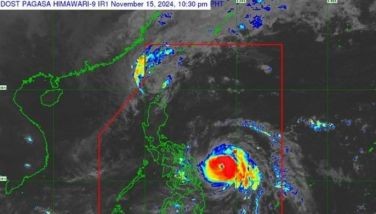DOLE: Most NCR firms break labor laws
October 14, 2002 | 12:00am
Workers in Metro Manila and Southern Tagalog appear to be the least to benefit from labor regulations.
According to data gathered by the Department of Labor and Employment (DOLE), nearly 80 percent of businesses in Metro Manila are violating labor and safety standards.
Of the 342 firms in the National Capital Region inspected by the DOLE in the first six months of the year, 269 or 78.7 percent were found with several violations, including non-payment of appropriate wages.
Forty percent of the violations involved non-compliance with the minimum wage law that requires employers to pay workers P280 a day.
On the other hand, most workers in Southern Tagalog, just outside Metro Manila, experienced the same situation with 83.8 percent or 660 of the 788 inspected establishments in the region found with various violations.
Forty-five percent of the establishments inspected were found violating the minimum wage law.
Other regions with high general labor and safety standard violations include CARAGA (71.4 percent of businesses inspected), Bicol (62.1 percent), Central Visayas (59 percent), Southern Mindanao (57.7 percent) and Central Mindanao (52.9 percent).
On the national average, 46.4 percent of the total 18,500 establishments inspected from January to June were not complying with labor regulations.
However, labor officials said more commercial establishments are now complying with labor standards and regulations compared to figures two years ago.
During the first six months of the year, a total of P23 million in back wages was awarded to 26,000 employees as companies were ordered by the DOLE to comply with regulations.
Meanwhile, more and more Filipino overseas workers are expected to find employment in the Middle East in the coming months in spite of a looming war between the United States and Iraq.
A delegation of local recruiters left for Riyadh, Saudi Arabia, last Friday to explore new business and employment opportunities for Filipinos there.
"We are hoping that our visit to Riyadh would result in additional job orders for Filipino workers considering the growing economy in Saudi Arabia," Eduardo Mahiya, president of the Overseas Placement Association of the Philippines, said.
He said the region is expected to remain the top destination for expatriate Filipino workers. The region accounts for almost half of the total deployment of Filipinos annually.
There are currently 1.4 million Filipinos in the Middle East and the number is still growing, according to the Philippine Overseas Employment Association.
Low wages and lack of jobs force thousands of Filipinos to seek jobs outside the country and the government heavily relies on their remittances to prop up the nation’s economy.
Over seven million Filipinos are working abroad, and they send home over $3 billion in remittances annually.
According to data gathered by the Department of Labor and Employment (DOLE), nearly 80 percent of businesses in Metro Manila are violating labor and safety standards.
Of the 342 firms in the National Capital Region inspected by the DOLE in the first six months of the year, 269 or 78.7 percent were found with several violations, including non-payment of appropriate wages.
Forty percent of the violations involved non-compliance with the minimum wage law that requires employers to pay workers P280 a day.
On the other hand, most workers in Southern Tagalog, just outside Metro Manila, experienced the same situation with 83.8 percent or 660 of the 788 inspected establishments in the region found with various violations.
Forty-five percent of the establishments inspected were found violating the minimum wage law.
Other regions with high general labor and safety standard violations include CARAGA (71.4 percent of businesses inspected), Bicol (62.1 percent), Central Visayas (59 percent), Southern Mindanao (57.7 percent) and Central Mindanao (52.9 percent).
On the national average, 46.4 percent of the total 18,500 establishments inspected from January to June were not complying with labor regulations.
However, labor officials said more commercial establishments are now complying with labor standards and regulations compared to figures two years ago.
During the first six months of the year, a total of P23 million in back wages was awarded to 26,000 employees as companies were ordered by the DOLE to comply with regulations.
Meanwhile, more and more Filipino overseas workers are expected to find employment in the Middle East in the coming months in spite of a looming war between the United States and Iraq.
A delegation of local recruiters left for Riyadh, Saudi Arabia, last Friday to explore new business and employment opportunities for Filipinos there.
"We are hoping that our visit to Riyadh would result in additional job orders for Filipino workers considering the growing economy in Saudi Arabia," Eduardo Mahiya, president of the Overseas Placement Association of the Philippines, said.
He said the region is expected to remain the top destination for expatriate Filipino workers. The region accounts for almost half of the total deployment of Filipinos annually.
There are currently 1.4 million Filipinos in the Middle East and the number is still growing, according to the Philippine Overseas Employment Association.
Low wages and lack of jobs force thousands of Filipinos to seek jobs outside the country and the government heavily relies on their remittances to prop up the nation’s economy.
Over seven million Filipinos are working abroad, and they send home over $3 billion in remittances annually.
BrandSpace Articles
<
>
- Latest
- Trending
Trending
Latest
Trending
Latest
Recommended






























